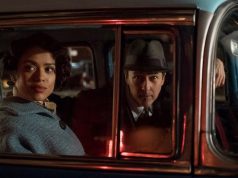Set against the backdrop of modern-day Tokyo — a place that is foreign in every sense of the word to most Americans — is Sofia Coppola’s lovely new film “Lost in Translation,” following two individuals who are as bewildered by life itself as they are by the language and customs of Japan.
This is a quiet, contemplative comedy whose comedic moments seem secondary in importance to its deeper, more beautiful ones. As much as I love comedies, I almost forget this is one in my remembrances of it.
We first meet Bob Harris (Bill Murray), a washed-up American actor in Tokyo to make some money doing whiskey commercials (having discovered, as have many not-so-washed-up American actors, the lucrative Asian endorsement market). His face already appears on billboards, but we get the impression this is his first actual visit to the Orient. He is bemused — not smug, as so many Bill Murray characters have been — by his obsequious Japanese hosts and the odd process of having a translator tell him the commercial director’s instructions. The bars are weird, the TV programs are unusual: Bob Harris doesn’t know what to make of this.
Neither does Charlotte (Scarlett Johansson), a young woman married to a rock ‘n’ roll photographer (Giovanni Ribisi) with no particular direction of her own. She and Bob are staying in the same hotel and have a few chance encounters. They are apparently the only Americans there, except for Charlotte’s husband John, who is busy with work most of the time. Charlotte doesn’t know what she’s doing with her life. Neither does Bob. The only difference between them is that he used to know, or thought he knew.
This isn’t going where you think. Charlotte is happily married, and Bob is married, if not happily, at least reliably. At the moment, they are simply two lost souls who can find respite in one another’s company for a few days.
Scarlet Johansson, best known heretofore for her supporting roles in “Ghost World” (2000) and “The Man Who Wasn’t There” (2001), is finally getting some much-deserved critical attention for her impressive work here. Her character is young — about 21, probably — but mature, and old enough to be a little frightened by life’s uncertainties.
And then there’s Bill Murray. Known primarily as a comedian, his more serious turns in “Rushmore” (1998) and “The Royal Tenenbaums” (2001) surprised many viewers and even inspired Oscar buzz. This time, don’t be alarmed if it actually happens. His performance in “Lost in Translation” is marvelously low-key and subtle, so natural and real that one is liable to overlook just how brilliant it is.
His humor is droll and dry; he burns slowly as he becomes increasingly annoyed by his surroundings, never giving way to full-blown anger. Bob is boyish and silly, especially around Charlotte, humor being his natural reaction to things and necessarily an indication of happiness. Murray’s scenes with a photographer and later with a Japanese prostitute are hilariously underplayed. Few actors could pull off such deadpan delivery with such comedic perfection.
And yet despite the humor, which is abundant, the film’s tone is more sweet than knee-slapping. Charlotte and Bob’s relationship is a thing of beauty, and if they don’t come out of it knowing any more about the world than they did before, at least they know there’s someone else just as perplexed as they are.
B+ (1 hr., 45 min.; )





